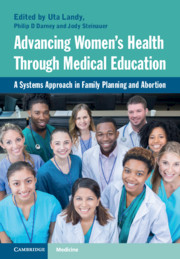 Advancing Women's Health Through Medical Education
Advancing Women's Health Through Medical Education from Section I - Abortion Training: Workforce, Leadership, Social & Political Impact
Published online by Cambridge University Press: 30 July 2021
Conscientious objection to sexual and reproductive healthcare (refusal to perform abortion, assisted reproductive technologies, prenatal diagnosis, contraception, including emergency contraception and sterilization, care for trans people etc.) has become a widespread global phenomenon and constitutes a barrier to these services for many.The tension between honoring one’s own integrity and respecting others’ rights to differ, and to have access to legal services, is further complicated for clinicians who have fiduciary duties to put patients’ needs ahead of their own.Medical and residency education must reconcile the right to conscience of students and residents with the need to ensure that these students and residents are well trained, able to demonstrate competency in all the components of their profession and specialty and clear about their fiduciary duties
To save this book to your Kindle, first ensure [email protected] is added to your Approved Personal Document E-mail List under your Personal Document Settings on the Manage Your Content and Devices page of your Amazon account. Then enter the ‘name’ part of your Kindle email address below. Find out more about saving to your Kindle.
Note you can select to save to either the @free.kindle.com or @kindle.com variations. ‘@free.kindle.com’ emails are free but can only be saved to your device when it is connected to wi-fi. ‘@kindle.com’ emails can be delivered even when you are not connected to wi-fi, but note that service fees apply.
Find out more about the Kindle Personal Document Service.
To save content items to your account, please confirm that you agree to abide by our usage policies. If this is the first time you use this feature, you will be asked to authorise Cambridge Core to connect with your account. Find out more about saving content to Dropbox.
To save content items to your account, please confirm that you agree to abide by our usage policies. If this is the first time you use this feature, you will be asked to authorise Cambridge Core to connect with your account. Find out more about saving content to Google Drive.